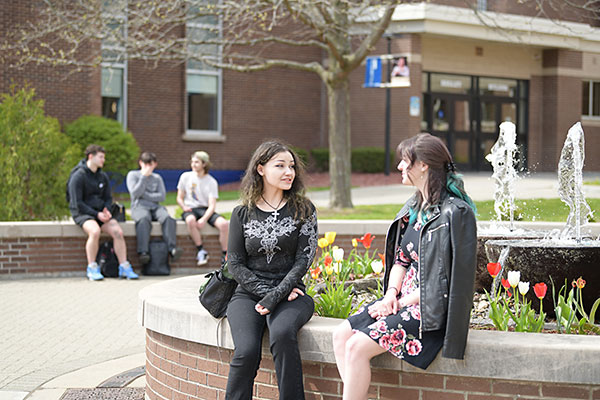Free Speech on Campus
Commitment to Freedom of Expression and Civil Dialogue
SUNY Schenectady respects and fully supports students, employees, and third parties in the exercise of their First Amendment rights. SUNY Schenectady believes that freedom of speech and expression is foundational to each student’s learning experience and central to our College’s mission and vision.
Information on this page is intended to help all members of the campus community understand how to exercise their right to free speech while protecting the rights of others to pursue their educational experience at SUNY Schenectady. SUNY Schenectady policies and rules contained in the Student Handbook will govern how the College handles each particular situation, and this webpage is not a replacement or substitute for the Student Handbook or any College policies.
SUNY Schenectady strives to create a safe environment for free speech and expressive activity protected by the U.S. Constitution. We encourage members of the campus community and all third parties to fully understand their rights and responsibilities pertaining to free speech, freedom of expression, and expressive activities on our campus.
The First Amendment to the U.S. Constitution does protect:
- the free exercise of religion
- the right to report news
- individuals’ rights to share their views, with restrictions as determined by law
- peaceful assembly for social-, economic-, political-, religious-, or protest-related purposes
The First Amendment does not protect the following:
- unrestricted speech at any time or place
- hate speech or discriminatory speech
- harassment
- unlawful conduct
- civil disobedience
- true threats and intimidation
- incitement of violence
- obscenity
- defamation
Speech that some consider biased or hateful is still protected by the First Amendment. The College is legally obligated to protect speech that some may find offensive, but speech that constitutes harassment or true threats, creates a hostile environment, or is overly disruptive to campus operations is not protected. The College encourages respectful civil discourse as part of students’ educational experience.
SUNY Schenectady views freedom of speech and freedom of expression as foundational to each student’s educational journey. Additionally, controversial speakers or presenters have a constitutional right to express their views. State and federal laws protect the rights of individuals and groups to express viewpoints that others might consider controversial, offensive, or even abhorrent, provided those viewpoints are within the bounds of what is considered protected speech.
Examples of permissible responses to controversial viewpoints include but are not limited to the following:
- engaging in civil dialogue
- engaging in protected speech of your own
- ignoring the speaker or not attending the expressive activity
Examples of responses to controversial viewpoints that are not permitted include but are not limited to the following:
- threatening a speaker
- committing any violent act against a speaker
- creating or contributing to a situation in which the speaker cannot be heard
Expressive activities protected by the First Amendment and New York State law include, but are not limited to, assembly, distribution of written material, petitions, protest, and speech. Similar to other SUNY institutions, SUNY Schenectady controls the time, place, and manner of public expressive activities in accordance with College policies. Expressive activities that disrupt or obstruct the College's mission or operations, interfere with others' free speech, or pose safety risks may require the College to respond in accordance with applicable laws and College policies.
Related policies:
Report any immediate physical threats to Campus Safety in one of the following ways:
- Using any blue light or red phones on campus
- Call extension 1308 or 5555 (internal)
- Call 518-381-1308 (from an external line)
- Visit the Campus Safety Office in Elston Hall, Room 341 or one of the Campus Safety desks throughout campus
Any students, employees, or third parties who witness or are impacted by a perceived act of bias, discrimination, or harassment on campus or in the course of College operations must report the incident to the relevant officer below:
- Affirmative Action Officer, Paula Ohlhous, at 518-381-1201 or ohlhoup@sunysccc.edu
- Title IX Coordinator, Mark Bessette, at 518-381-1353 or titleix@sunysccc.edu
All reports of bias, discrimination, and harassment are investigated by the College in accordance with College policies.
Related policies include:
- Policy 2.12 Diversity Statement
- Policy 2.13 (and 3.15) Procedure for Resolving Complaints of Discrimination, Harassment, and Retaliation
- Policy 3.1 Student Code of Conduct
- Policy 3.14 Bias related Crime Prevention Policy
- Policy 3.15 (and 2.13) Procedure for Resolving Complaints of Discrimination, Harassment, and Retaliation
- Policy 3.19 (and 2.23) Title IX Grievance Policy
- Policy 3.20 (and 2.14) Sexual Harassment Response and Prevention Statement
- First Amendment Watch at NYU, "Limits to Free Speech Lesson" (YouTube video)
- First Amendment Watch at NYU, “Talking Across Differences” (YouTube video)
- Free Speech Center, “The First Amendment: 7 things you need to know”
- National Coalition Against Censorship, “First Amendment Rights for Student Protesters”
- National Constitution Center, “First Amendment: Freedom of Religion, Speech, Press, Assembly, and Petition”
- SUNY Schenectady, “Title IX”
- United States Courts, “What Does Free Speech Mean?”
- U.S. Department of Justice Civil Rights Division, “Title VI of the Civil Rights Act of 1964”
